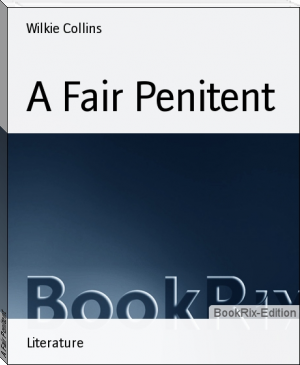Droll Stories - Volume 3 by Honoré de Balzac (best contemporary novels .TXT) 📖

- Author: Honoré de Balzac
Book online «Droll Stories - Volume 3 by Honoré de Balzac (best contemporary novels .TXT) 📖». Author Honoré de Balzac
"Willingly," said the provost. "But I am an old bird, not easily caught with chaff, and would like to be sure that it is really a lady of the court, and not an Englishman, for these English have flesh as white and soft as women, and I know it well, because I've hanged so many of them."
"Well then," said the lord, "seeing of what crime I am suspected, from which I am bound to free myself, I will go and ask my lady-love to consent for a moment to abandon her modesty. She is too fond of me to refuse to save me from reproach. I will beg her to turn herself over and show you a physiognomy, which will in no way compromise her, and will be sufficient to enable you to recognise a noble woman, although she will be in a sense upside down."
"All right," said the provost.
The lady having heard every word, had folded up all her clothes, and put them under the bolster, had taken off her chemise, that her husband should not recognise it, had twisted her head up in a sheet, and had brought to light the carnal convexities which commenced where her spine finished.
"Come in, my friend," said the lord.
The provost looked up the chimney, opened the cupboard, the clothes' chest, felt under the bed, in the sheets, and everywhere. Then he began to study what was on the bed.
"My lord," said he, regarding his legitimate appurtenances, "I have seen young English lads with backs like that. You must forgive me doing my duty, but I must see otherwise."
"What do you call otherwise?" said the lord.
"Well, the other physiognomy, or, if you prefer it, the physiognomy of the other."
"Then you will allow madame to cover herself and arrange only to show you sufficient to convince you," said the lover, knowing that the lady had a mark or two easy to recognise. "Turn your back a moment, so that my dear lady may satisfy propriety."
The wife smiled at her lover, kissed him for his dexterity, arranging herself cunningly; and the husband seeing in full that which the jade had never let him see before, was quite convinced that no English person could be thus fashioned without being a charming Englishwoman.
"Yes, my lord," he whispered in the ear of his lieutenant, "this is certainly a lady of the court, because the towns-women are neither so well formed nor so charming."
Then the house being thoroughly searched, and no Englishman found, the provost returned, as the constable had told him, to the king's residence.
"Is he slain?" said the constable.
"Who?"
"He who grafted horns upon your forehead."
"I only saw a lady in his couch, who seemed to be greatly enjoying herself with him."
"You, with your own eyes, saw this woman, cursed cuckold, and you did not kill your rival?"
"It was not a common woman, but a lady of the court."
"You saw her?"
"And verified her in both cases."
"What do you mean by those words?" cried the king, who was bursting with laughter.
"I say, with all the respect due to your Majesty, that I have verified the over and the under."
"You do not, then, know the physiognomies of your own wife, you old fool without memory! You deserve to be hanged."
"I hold those features of my wife in too great respect to gaze upon them. Besides she is so modest that she would die rather than expose an atom of her body."
"True," said the king; "it was not made to be shown."
"Old coquedouille! that was your wife," said the constable.
"My lord constable, she is asleep, poor girl!"
"Quick, quick, then! To horse! Let us be off, and if she be in your house I'll forgive you."
Then the constable, followed by the provost, went to the latter's house in less time than it would have taken a beggar to empty the poor-box.
"Hullo! there, hi!"
Hearing the noise made by the men, which threatened to bring the walls about their ears, the maid-servant opened the door, yawning and stretching her arms. The constable and the provost rushed into the room, where, with great difficulty, they succeeded in waking the lady, who pretended to be terrified, and was so soundly asleep that her eyes were full of gum. At this the provost was in great glee, saying to the constable that someone had certainly deceived him, that his wife was a virtuous woman, and was more astonished than any of them at these proceedings. The constable turned on his heel and departed. The good provost began directly to undress to get to bed early, since this adventure had brought his good wife to his memory. When he was harnessing himself, and was knocking off his nether garments, madame, still astonished, said to him--
"Oh, my dear husband, what is the meaning of all this uproar--this constable and his pages, and why did he come to see if I was asleep? Is it to be henceforward part of a constable's duty to look after our . . ."
"I do not know," said the provost, interrupting her, to tell her what had happened to him.
"And you saw without my permission a lady of the court! Ha! ha! heu! heu! hein!"
Then she began to moan, to weep, and to cry in such a deplorable manner and so loudly, that her lord was quite aghast.
"What's the matter, my darling? What is it? What do you want?"
"Ah! You won't love me any more are after seeing how beautiful court ladies are!"
"Nonsense, my child! They are great ladies. I don't mind telling you in confidence; they are great ladies in every respect."
"Well," said she, "am I nicer?"
"Ah," said he, "in a great measure. Yes!"
"They have, then, great happiness," said she, sighing, "when I have so much with so little beauty."
Thereupon the provost tried a better argument to argue with his good wife, and argued so well that she finished by allowing herself to be convinced that Heaven has ordained that much pleasure may be obtained from small things.
This shows us that nothing here below can prevail against the Church of Cuckolds.
ABOUT THE MONK AMADOR, WHO WAS A GLORIOUS ABBOT OF TURPENAY
One day that it was drizzling with rain--a time when the ladies remain gleefully at home, because they love the damp, and can have at their apron strings the men who are not disagreeable to them--the queen was in her chamber, at the castle of Amboise, against the window curtains. There, seated in her chair, she was working at a piece of tapestry to amuse herself, but was using her needle heedlessly, watching the rain fall into the Loire, and was lost in thought, where her ladies were following her example. The king was arguing with those of his court who had accompanied him from the chapel--for it was a question of returning to dominical vespers. His arguments, statements, and reasonings finished, he looked at the queen, saw that she was melancholy, saw that the ladies were melancholy also, and noted the fact that they were all acquainted with the mysteries of matrimony.
"Did I not see the Abbot of Turpenay here just now?" said he.
Hearing these words, there advanced towards the king the monk, who, by his constant petitions, rendered himself so obnoxious to Louis the Eleventh, that that monarch seriously commanded his provost-royal to remove him from his sight; and it has been related in the first volume of these Tales, how the monk was saved through the mistake of Sieur Tristan. The monk was at this time a man whose qualities had grown rapidly, so much so that his wit had communicated a jovial hue to his face. He was a great favourite with the ladies, who crammed him with wine, confectioneries, and dainty dishes at the dinners, suppers, and merry-makings, to which they invited him, because every host likes those cheerful guests of God with nimble jaws, who say as many words as they put away tit-bits. This abbot was a pernicious fellow, who would relate to the ladies many a merry tale, at which they were only offended when they had heard them; since, to judge them, things must be heard.
"My reverend father," said the king, "behold the twilight hour, in which ears feminine may be regaled with certain pleasant stories, for the ladies can laugh without blushing, or blush without laughing, as it suits them best. Give us a good story--a regular monk's story. I shall listen to it, i'faith, with pleasure, because I want to be amused, and so do the ladies."
"We only submit to this, in order to please your lordship," said the queen; "because our good friend the abbot goes a little too far."
"Then," replied the king, turning towards the monk, "read us some Christian admonition, holy father, to amuse madame."
"Sire, my sight is weak, and the day is closing."
"Give us a story, then, that stops at the girdle."
"Ah, sire!" said the monk, smiling, "the one I am thinking of stops there; but it commences at the feet."
The lords present made such gallant remonstrances and supplications to the queen and her ladies, that, like the good Bretonne that she was, she gave the monk a gentle smile, and said--
"As you will, my father; but you must answer to God for our sins."
"Willingly, madame; if it be your pleasure to take mine, you will be a gainer."
Everyone laughed, and so did queen. The king went and sat by his dear wife, well beloved by him, as everyone knows. The courtiers received permission to be seated--the old courtiers, of course, understood; for the young ones stood, by the ladies' permission, beside their chairs, to laugh at the same time as they did. Then the Abbot of Turpenay gracefully delivered himself of the following tale, the risky passages of which he gave in a low, soft, flute-like voice:--
About a hundred years ago at the least, there occurred great quarrels in Christendom because there were two popes at Rome, each one pretending to be legitimately elected, which caused great annoyance to the monasteries, abbeys, and bishoprics, since, in order to be recognised by as many as possible, each of the two popes granted titles and rights to each adherent, the which made double owners everywhere. Under these circumstances, the monasteries and abbeys that were at war with their neighbours would not recognise both the popes, and found themselves much embarrassed by the other, who always gave the verdict to the enemies of the Chapter. This wicked schism brought about considerable mischief, and proved abundantly that error is worse in Christianity than the adultery of the Church.
Now at this time, when the devil was making havoc among our possessions, the most illustrious abbey of Turpenay, of
 Have you ever thought about what fiction is? Probably, such a question may seem surprising: and so everything is clear. Every person throughout his life has to repeatedly create the works he needs for specific purposes - statements, autobiographies, dictations - using not gypsum or clay, not musical notes, not paints, but just a word. At the same time, almost every person will be very surprised if he is told that he thereby created a work of fiction, which is very different from visual art, music and sculpture making. However, everyone understands that a student's essay or dictation is fundamentally different from novels, short stories, news that are created by professional writers. In the works of professionals there is the most important difference - excogitation. But, oddly enough, in a school literature course, you don’t realize the full power of fiction. So using our website in your free time discover fiction for yourself.
Have you ever thought about what fiction is? Probably, such a question may seem surprising: and so everything is clear. Every person throughout his life has to repeatedly create the works he needs for specific purposes - statements, autobiographies, dictations - using not gypsum or clay, not musical notes, not paints, but just a word. At the same time, almost every person will be very surprised if he is told that he thereby created a work of fiction, which is very different from visual art, music and sculpture making. However, everyone understands that a student's essay or dictation is fundamentally different from novels, short stories, news that are created by professional writers. In the works of professionals there is the most important difference - excogitation. But, oddly enough, in a school literature course, you don’t realize the full power of fiction. So using our website in your free time discover fiction for yourself. 




Comments (0)